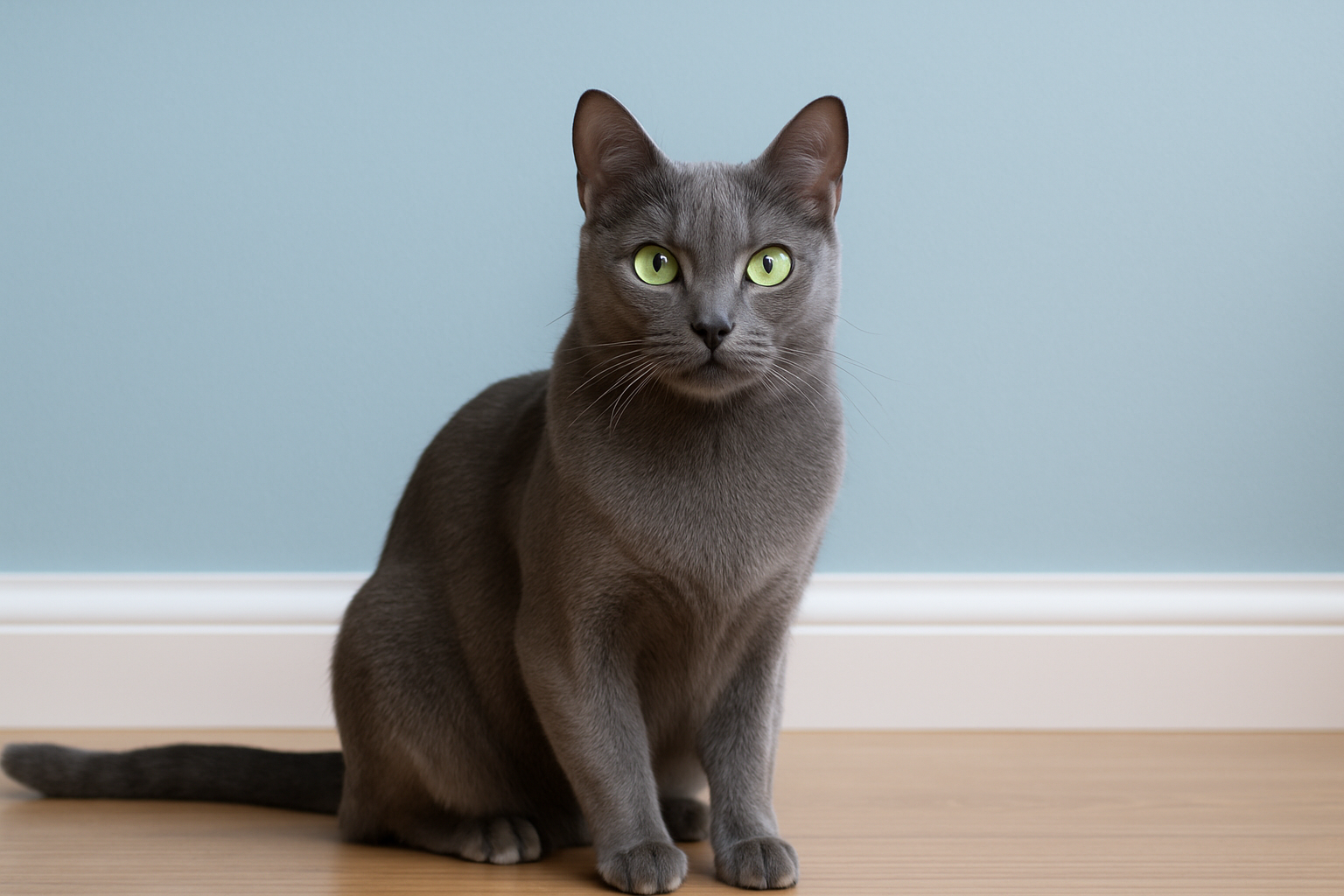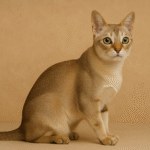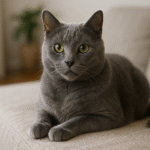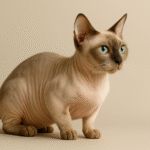There’s something quietly striking about the Korat Cat. With its shimmering silver-blue coat, heart-shaped face, and bright green eyes, this rare breed from Thailand doesn’t need to show off to get your attention. It just has a presence that draws you in.
Korats are more than just pretty faces. They’re affectionate, intuitive, and often form strong, lifelong bonds with their humans. Whether they’re curled up beside you or softly chirping for attention, these cats have a way of making you feel chosen. And they truly mean it.
Quick Breed Facts
- Origin: Thailand
- Breed registries: CFA, TICA, FIFe
- Weight range: 6–10 pounds
- Lifespan: 12–15 years
- Coat: Short, single-layered
- Colors and patterns: Silver-blue only
- Eye color: Vivid green (amber in kittens)
- Grooming: Low maintenance
- Activity level: Moderate to high
- Affection level: Very affectionate with family
- Vocality: Talkative and expressive
- Good with children: Yes, with respectful kids
- Good with other pets: Can be selective
History & Origin
The Korat Cat has been part of Thai culture for centuries, where it’s seen as a symbol of good luck and prosperity. Called the “Si-Sawat” cat in its homeland, it was often given in pairs to newlyweds as a blessing for a happy life together. Ancient references to the Korat even appear in The Cat-Book Poems, a historic Thai manuscript that describes lucky cats.
Breeders first brought Korats to the United States during the 1950s, and they were officially recognized by the Cat Fanciers’ Association a decade later. While they’ve gained a small but passionate following, Korats are still considered a rare breed outside of Thailand. Breeders today are focused on preserving the cat’s unique appearance and cultural heritage.
Personality & Temperament
The Korat Cat is a loyal and intelligent breed that forms deep bonds with its humans. These cats are often described as “people-focused,” following their favorite person from room to room and wanting to be involved in everything. Don’t be surprised if your Korat insists on sitting in your lap (or even your face) while you work, relax, or sleep.
Korats are affectionate with their families but can be shy or reserved around strangers. They usually stay quiet when meeting someone new but will warm up once they feel safe. Their large, expressive eyes and soft, musical meows make it easy to know how they’re feeling. These cats wear their hearts on their fur.
Activity & Play
Korats are playful and curious, but they’re not as hyper as some high-energy breeds. They love climbing, puzzle toys, and interactive play, but they’re just as happy curling up in your lap when it’s time to wind down. Their intelligence makes them great candidates for games that challenge both mind and body.
To keep your Korat engaged, rotate their toys often and mix in activities that encourage exploration. A multi-level setup like a well-designed cat tree gives them a fun way to exercise and a cozy place to observe everything going on around them.
Grooming & Care
The Korat’s short, single-layered coat is silky and low-shedding. A light brushing once a week is usually enough to keep their fur smooth and remove any loose hairs. Since they don’t have an undercoat, they’re less likely to develop mats and don’t need much grooming to stay tidy.
Regular nail trims, ear checks, and dental care will help your Korat feel their best. These cats can be sensitive to strong smells or sudden changes in routine, so a calm, predictable environment will go a long way in keeping them comfortable and stress-free.
Health & Lifespan
The Korat is generally a healthy breed with a typical lifespan of 12 to 15 years. There is one genetic condition that potential owners should know about: GM1 and GM2 gangliosidosis, a rare and serious neurological disease. Responsible breeders screen for these conditions to help ensure their kittens are healthy and safe.
Regular vet visits, a balanced diet, and keeping your Korat indoors can all help them live a long and happy life. If you ever have questions about symptoms or general care, don’t hesitate to talk with your vet—or check out our full library of cat health guides for more support.
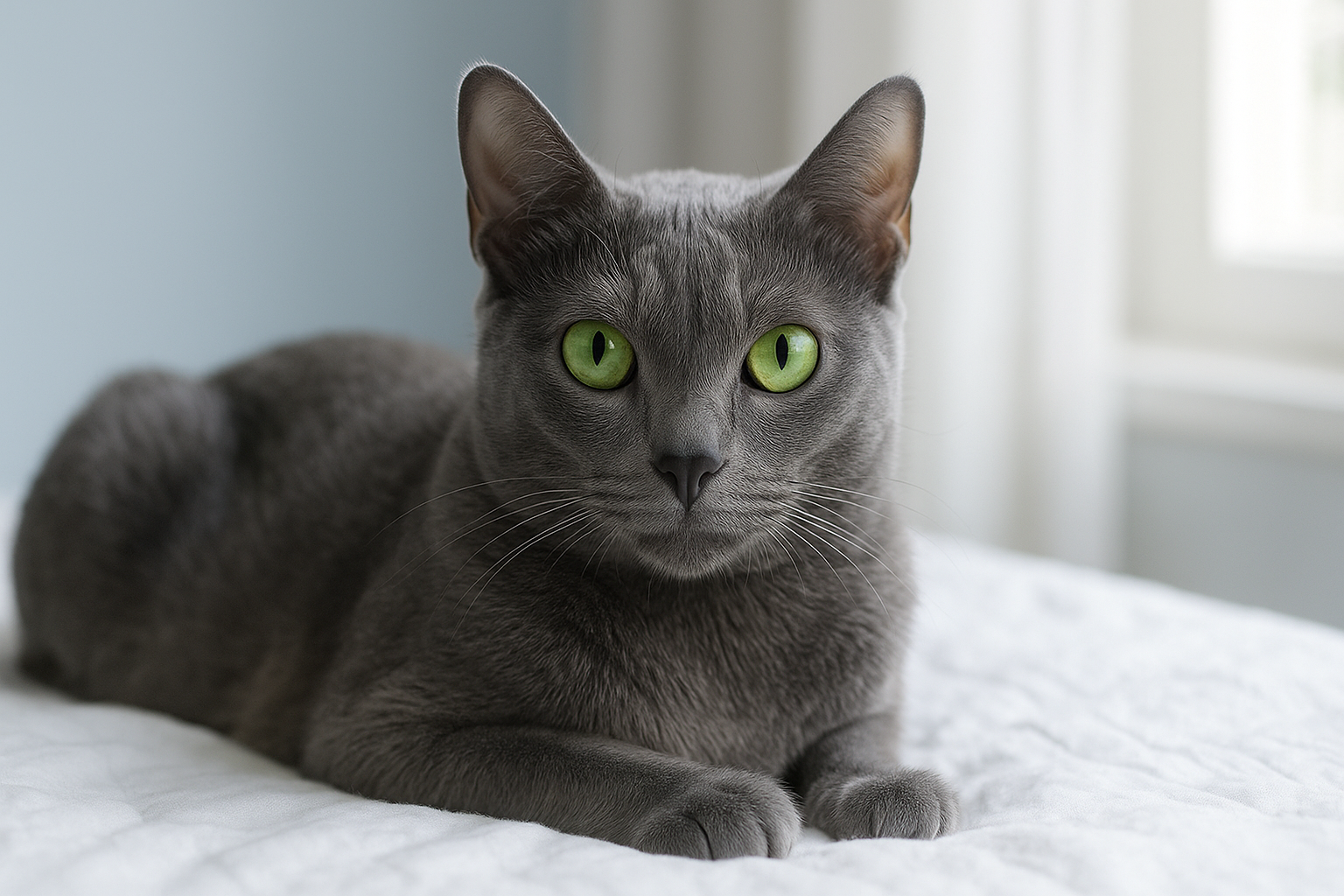
Family Compatibility
Korats make wonderful companions for calm, affectionate households. They thrive on human connection and often form especially close bonds with one favorite person. While they might be a little shy at first, their trust grows with time. Once it does, their loyalty runs deep.
These cats do best in homes where they’re not left alone all day. They love being involved in your daily life and don’t enjoy being ignored. If your family offers attention, predictability, and gentle handling, the Korat will repay you with a friendship that’s as steady as it is sweet.
Recommended Supplies
Korats don’t need a lot of fancy gear, but a few thoughtful essentials can make a big difference. A soft, padded bed, rotating toys, a place to climb, and a good-quality litter system will cover most of their day-to-day needs. Since they’re a sensitive breed, they tend to appreciate soft materials and peaceful spaces to unwind.
Because Korats are so people-oriented, it helps to include a few comfort items that remind them of you. A cozy blanket with your scent or a sunny window perch can give them a sense of security when you’re not around. And of course, nothing beats a little daily one-on-one playtime.
How Much Does a Korat Cat Cost?
The average korat cat price ranges from $500 to $2,500, depending on where you live, the breeder’s reputation, and whether the kitten comes from show-quality lines. Since Korats are rare and often bred in small numbers, it’s not unusual to find yourself on a waitlist—especially if you’re looking for a kitten with health screenings and pedigree papers.
If you’re hoping to adopt, it’s worth checking with breed-specific rescues or browsing Petfinder. While it’s uncommon to find a Korat through general adoption, some organizations do specialize in purebred or special needs cats—and you might just get lucky.
Korat Cat vs Russian Blue
At first glance, the Korat and the Russian Blue can look a lot alike. They both have sleek blue-gray coats and striking green eyes. But once you get to know them, the differences in personality and appearance really start to show.
Korats tend to be more muscular, with a heart-shaped face and a close-lying single coat. Russian Blues are more slender, with a soft double coat that feels plush to the touch. Personality-wise, Korats are often more social and intense with their affection, while Russian Blues lean more toward the quiet, independent side.
Korat Cat FAQs
Are Korat Cats hypoallergenic?
No, Korats aren’t considered hypoallergenic. But thanks to their short, low-shedding coats, they may trigger fewer allergies than longer-haired breeds. If you or someone in your home is sensitive, it’s a good idea to spend time with a Korat before adopting one.
Do Korats get along with dogs?
They can, especially if the dog is calm and respectful. Korats don’t usually enjoy loud, high-energy pets, but with slow introductions and some personal space, many can adjust just fine to living with a dog.
How do I find a reputable Korat breeder?
Check breeder listings with the Cat Fanciers’ Association (CFA) or TICA. Look for breeders who test for GM1 and GM2, provide vet records, and are open to questions. A good breeder will want their kittens going to loving, informed homes.
Do Korats like to be held?
Many Korats do enjoy being held and cuddled, especially if they’ve bonded closely with you. They thrive on attention and affection, but like all cats, they appreciate being able to choose when and how. Let your Korat guide the pace and build trust naturally.
Is the Korat Cat Right for You?
Elegant, expressive, and endlessly loyal, the Korat Cat is a true treasure among feline breeds. Whether you’re drawn to their shimmering silver-blue coat or their soulful green eyes, it’s their heart and devotion that make them unforgettable companions.
While they may not be the right fit for every home, Korats thrive with people who appreciate deep connections and quiet companionship. If you welcome a Korat into your life, you’ll gain a friend who sticks by your side through every cozy night, playful moment, and purring conversation.

